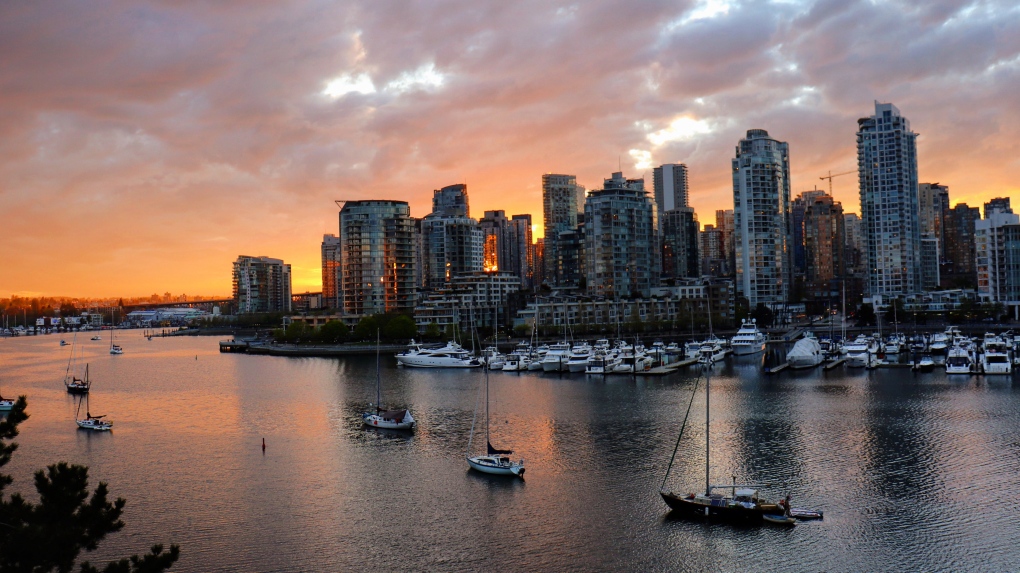Only 'modest' drop in Vancouver home prices forecast for 2023: Royal LePage
 The Vancouver skyline is seen from the Cambie Street Bridge in April 2020. (Eleni Gardikiotis, submitted through our app, Weather Watch by CTV Vancouver)
The Vancouver skyline is seen from the Cambie Street Bridge in April 2020. (Eleni Gardikiotis, submitted through our app, Weather Watch by CTV Vancouver)
Housing prices in the Vancouver area might only experience a "modest" decrease over the next 12 months, according to a new forecast from Royal LePage.
While the company is expecting prices to continue falling into 2023, forecasters are anticipating real estate will rebound by the fourth quarter – leaving the aggregate price of a Vancouver home down just one per cent year-over-year, at around $1.22 million.
That could mean a short window for potential buyers hoping to take advantage of the slowed down real estate market, said Sean Burns, managing partner at Royal LePage Coast Capital and Sterling Realty.
Burns told CTV News there's some debate over whether prices will rebound in spring or summer – but that it's widely expected to be one or the other.
"I think a lot of people will look back at November, this month and next month as the window they should have gotten into the market," he added.
Royal LePage's Market Survey Forecast predicts single-family detached properties will see a more significant decrease of two per cent by fourth quarter 2023, which would bring the median price to $1.64 million.
The median price of condos, meanwhile, is expected to increase by one per cent, reaching $747,299 over the same period.
While prices have been decreasing since the Bank of Canada began implementing a series of interest rate hikes back in March, Royal LePage noted there were years of price appreciation during the COVID-19 pandemic.
If the company's forecast for next year proves accurate, Burns said prices would still remain well above pre-pandemic levels – though he acknowledged unanticipated challenges could arise that impact both the housing market and the economy at large.
"You know, hopefully we don't see another pandemic," Burns said. "There are wars in the world. And our economy will follow the U.S. – though even this morning the U.S. announced really strong economic growth."
Royal LePage said so far, the limited impact of rising interest rates on housing prices has "not followed historical patterns," which the company chalked up to a number of factors buoying the market, including ongoing issues with supply and pent-up demand among buyers who have waited by the sidelines throughout the global crisis.
"Even now, in December, it's very unusual but on some properties we're seeing competing offers, and it's because there's hardly any product out there available for purchase," Burns said.
CTVNews.ca Top Stories

B.C. tenants evicted for landlord's use after refusing large rent increase to take over neighbouring suite
Ashley Dickey and her mother rented part of the same Coquitlam duplex in three different decades under three different landlords.
Mountain guide dies after falling into a crevasse in Banff National Park
A man who fell into a crevasse while leading a backcountry ski group deep in the Canadian Rockies has died.
Expert warns of food consumption habits amid rising prices
A new survey by Dalhousie University's Agri-Food Analytics Lab asked Canadians about their food consumption habits amid rising prices.
MPP Sarah Jama asked to leave Ontario legislature for wearing keffiyeh
MPP Sarah Jama was asked to leave the Legislative Assembly of Ontario by House Speaker Ted Arnott on Thursday for wearing a keffiyeh, a garment which has been banned at Queen’s Park.
Charlie Woods, son of Tiger, shoots 81 in U.S. Open qualifier
Charlie Woods failed to advance in a U.S. Open local qualifying event Thursday, shooting a 9-over 81 at Legacy Golf & Tennis Club.
Ex-tabloid publisher testifies he scooped up possibly damaging tales to shield his old friend Trump
As Donald Trump was running for president in 2016, his old friend at the National Enquirer was scooping up potentially damaging stories about the candidate and paying out tens of thousands of dollars to keep them from the public eye.
Here's why provinces aren't following Saskatchewan's lead on the carbon tax home heating fight
After Prime Minister Justin Trudeau said the federal government would still send Canada Carbon Rebate cheques to Saskatchewan residents, despite Saskatchewan Premier Scott Moe's decision to stop collecting the carbon tax on natural gas or home heating, questions were raised about whether other provinces would follow suit. CTV News reached out across the country and here's what we found out.
Montreal actress calls Weinstein ruling 'discouraging' but not surprising
A Montreal actress, who has previously detailed incidents she had with disgraced Hollywood producer Harvey Weinstein, says a New York Court of Appeals decision overturning his 2020 rape conviction is 'discouraging' but not surprising.
Caleb Williams, Jayden Daniels and Drake Maye make it four NFL drafts with quarterbacks going 1-3
Caleb Williams is heading to the Windy City, aiming to become the franchise quarterback Chicago has sought for decades.

































